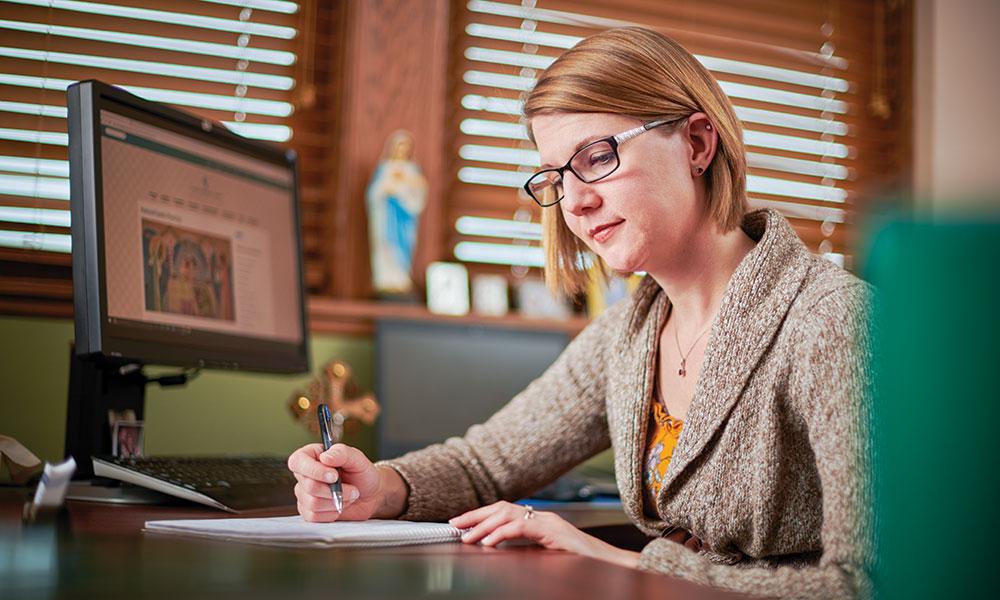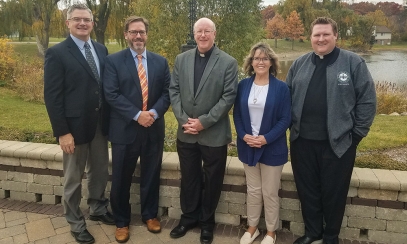
The office of fertility and life ministries works to uphold the dignity of human life
It’s as if Jenny Ingles stood in front of a column of perfectly aligned doors, each bringing her an opportunity to open subsequent ones. The first door opened during a college course called Christian Love. The professor and class discussion provided fruitful ground for Jenny, then a professed atheist, to realize her views on sexuality were in alignment with Catholic theology. Door #2 was another class Jenny took, this time with her husband as they prepared to convalidate their marriage in the Church. Experiencing infertility, the required Natural Family Planning (NFP) class became an answer to their prayers. Successfully birthing three children using NFP, Jenny began teaching NFP to other couples. The result was door #3, becoming the full-time director of fertility and life ministries in 2018.
The work of fertility and life ministries is based on Catholic teaching which upholds the sacredness and sanctity of all human life. “I wish every Catholic fully understood what it means to be the image and likeness of God in your marital relationship. That is the real meaning of sexuality. If everyone understood that, all other things would fall into place,” says Jenny.
Jenny’s department, which is funded with DSA support and housed in the department of vocations, works hard to give substance to that wish. While both divisions, life and fertility, overlap in many areas, there are a few specifics to each one. The fertility piece provides NFP education as a part of marriage preparation, and is responsible for training individuals to teach those classes. The diocese prescribes to several NFP methods or models: the Billings Method, the Creighton Model, the Marquette Method, and the Couple to Couple League, and works at having trained staff available for each of them. Constantly looking for ways to reach and better serve the diocesan population, Jenny is currently working on locating and training instructors who speak Vietnamese and Spanish.
“This is all about working with God’s natural plan for the female body to plan pregnancy. Contraceptives take God out of it. Our offices provide NFP practitioners who are knowledgeable on Theology of the Body and Humanae Vitae. We help people understand the Church’s teaching on sexuality and the beauty behind it,” Jenny says.
In terms of the life aspect of her ministry, Jenny says: “I’ve been working on getting all the individual ministries our various parishes provide to network in order to have a stronger pro-life presence in the diocese. We have found the truly successful pro-life parishes are the ones that vibrantly embrace the four pillars of prayer, activism, education and healing. Our goal is to be a resource for parishes to locate what they need in order to offer all four of those pillars to their own parishioners.” One of the ways Jenny helps parishes tackle this is by offering grants for resources or materials. Applications are always available.
“Our long term goal is to end abortion. I want every person in the pew to know where they can turn if they or someone they know is post-abortive or considering it. Abortion has affected a lot of people. There is a need for healing, to know God loves them, forgives them and wants to pour out his mercy on them,” she says.
Jenny’s ministry is one that often deals with despair. She says, “A lot of brokenness comes out in our sexuality, in our spousal relationships. Jesus meets people in a very profound way when learning Theology of the Body. When couples encounter God’s truth, they find joy, hope and love and when they start to heal themselves, they can work on their relationship with their spouse and with God. They become disciples.”
The office of fertility and life ministries, and all of its offerings, is available to every parishioner in the diocese because of DSA funding. DSA dollars provide grants for pro-life services at parishes, to fund Crisis Pregnancy services, Sidewalk Counseling initiatives, and miscarriage support, to name a few. A significant portion of funding goes to training both NFP teachers and registered nurses to help couples use NFP. NFP instruction is also part of marriage preparation classes. The Diocese of Lansing is one of the few dioceses which provide these services free of charge. Jenny’s dream is for her office to have sufficient financial resources and trained nurses to allow every parish to have an active and thriving pro-life and pro-NFP community, and that these communities in turn offer education and intercessory prayers to promote the sanctity of life.
Jenny’s willingness to venture through each of the doors that have popped up in her life have deeply affected her faith. She says: “This ministry has helped me see how delicately and lovingly Christ works in people’s lives and the resulting healing. It is very humbling to be part of the intimacy couples share and to watch God working through them.”
Q: What is NFP?
A: “Natural Family Planning (NFP) is the general title for the scientific, natural, and moral methods of family planning that can help married couples either achieve or postpone pregnancies.
For a 2020 NFP class schedule, to register, or for answers to other NFP FAQs, visit: www.DioceseofLansing.org/NFP.



